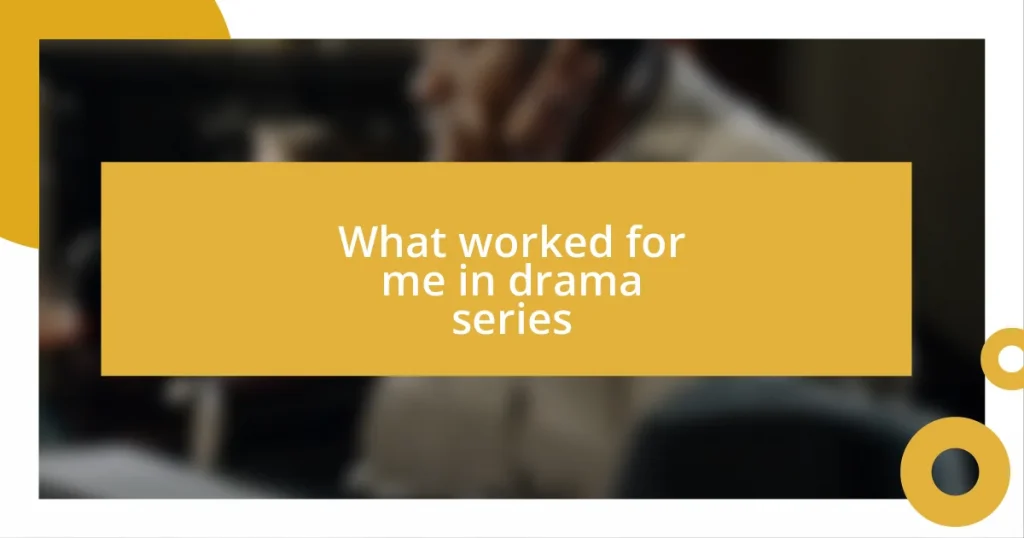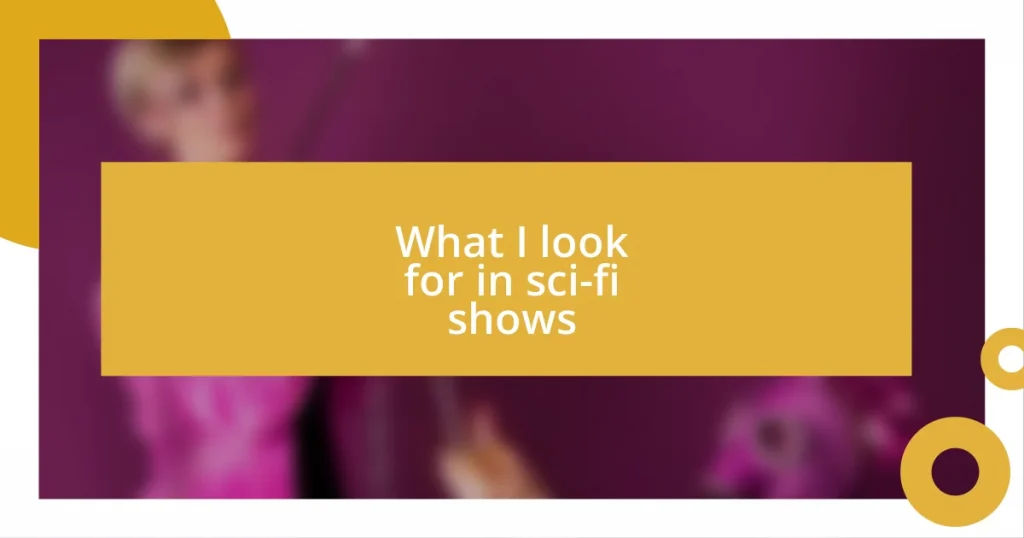Key takeaways:
- Endings significantly influence audience perception and emotional connection to a series, often overshadowing initial impressions.
- Key criteria for evaluating series endings include character development, theme resolution, pacing, narrative consistency, and emotional impact.
- Successful endings evoke strong audience reactions and contribute to meaningful discourse, shaping viewers’ expectations for future series.
Understanding the importance of endings
Endings hold a unique power, often defining how we feel about a series long after we’ve watched the final episode. I remember finishing a beloved show only to be left with a hollow sense of disappointment. The anticipation I built throughout the season faded away because the ending felt rushed and unresolved—did that ever happen to you?
I’ve found that a great ending can elevate an entire series, leaving a lasting emotional impact. Think about those moments where everything clicks into place, making the journey feel worthwhile. Isn’t it satisfying when a character’s arc culminates in a way that resonates deeply, as if they’ve taken you right along with them on their journey?
When we reflect on a series, the ending often lingers more vividly than the beginning. I often ask myself: What did the creators want us to take away from it? The emotional weight a finale carries can transform our understanding of the themes explored throughout the show, connecting us back to those characters in profound ways.
Criteria for evaluating series endings
When evaluating a series ending, I focus on several key criteria that guide my judgments. Emotional resonance is crucial for me; I often find endings that evoke strong feelings stay with me longer, almost like an aftertaste that enriches the overall narrative. If the ending ties back into the main themes while providing closure—or cleverly keeps things open for interpretation—it truly makes a lasting impact.
Here are some specific criteria I consider essential for evaluating series endings:
- Character Development: Did the characters evolve in a meaningful way?
- Theme Resolution: Were the show’s central themes addressed or resolved?
- Pacing and Structure: Did the ending feel rushed or well-crafted?
- Narrative Consistency: Did it stay true to the established lore and tone?
- Emotional Impact: How strongly did it resonate with me on a personal level?
Reflecting on a series finale I once watched, I remember feeling a wave of satisfaction when the protagonist’s journey concluded in a way that mirrored their struggles. I realized that a thoughtful ending not only provides closure but also deepens the connection to the story and its characters. It’s astonishing how a well-executed finale can turn what might have been a mediocre series into one that resonates for years to come.
Common pitfalls in series conclusions
It’s easy to fall into some common pitfalls when wrapping up a series. One major mistake is overlooking character unresolved arcs. I once invested countless hours in a show only to watch the final season introduce a flurry of new characters, leaving the original cast’s journeys feeling unfinished. It’s frustrating when the emotional threads we’ve followed throughout the series get tangled up in new plotlines. I believe, to truly satisfy viewers, there must be a clear resolution for the characters we’ve come to care about.
Another common issue is trying to cram too much into the final episodes. I remember watching a series that suddenly rushed to tie up every loose end in a single hour. It felt chaotic rather than compelling, and I was left wondering how so many ideas were squeezed in without proper development. A good finale benefits from pacing that allows for both reflection and closure, something I personally cherish in a satisfying conclusion.
Lastly, failing to remain consistent with the series’ established themes can leave viewers feeling betrayed. One show I loved took a drastic turn in its final season, moving away from the core themes that initially hooked me. It felt jarring, almost as if I had been watching a different story altogether. When an ending deviates too far from what made the series special, it can overshadow everything that came before it.
| Pitfall | Description |
|---|---|
| Unresolved Character Arcs | Failing to give closure to characters we’ve invested in can ruin the emotional payoff of a series. |
| Rushed Conclusions | Cramping too many plotlines into the finale can result in a chaotic and unsatisfying ending. |
| Inconsistent Themes | Drastically changing core themes can alienate fans who loved the original direction. |
Techniques to analyze endings
Analyzing endings of series often starts with looking at how well they wrap up character arcs. I remember watching a beloved show where the main character had a transformative journey, and as the finale unfolded, I found myself holding my breath, waiting to see if they would stay true to their growth. It’s a rewarding feeling when you see characters face the consequences of their choices, so how does the final choice reflect their journey? A considerate ending should not only honor character development but also evoke a sense of closure that resonates with what you’ve invested emotionally.
Next, I dive into the thematic payoff of a series. Think about a show with a strong message—does the finale tie it back effectively? I once followed a series that cleverly intertwined its themes with the finale, making it feel like the culmination of everything that had happened. It was in that moment I realized how pivotal it is for the ending to echo those themes and offer a form of resolution. The challenges faced throughout the series felt validated, and I walked away feeling that the narrative had come full circle, leaving me both satisfied and contemplative.
Another technique I utilize is examining the pacing of the ending. I can’t help but recall a series that, instead of lingering on poignant moments, sped through its finales like a race. Did it achieve a balance between wrapping things up and giving me the space to digest what I was witnessing? Personal reflection plays a big role here—an ending shouldn’t feel like a checklist to tick off, but rather a journey that allows for all emotions to surface. This thoughtfulness in pacing is something I’ve come to cherish, as it often transforms the experience from mere viewing into meaningful engagement with the story.
Examples of successful endings
One of my favorite examples of a successful ending is from “The Sopranos.” The final moments, with Tony in the diner, had viewers on the edge of their seats, creating a perfect blend of tension and ambiguity. I vividly remember sitting with my friends, debating what the ending truly meant, which sparked a rich conversation about the entire series’ exploration of morality and consequence.
Another standout ending is “Breaking Bad.” The way Walter White’s journey culminates in a confrontation that reflects his transformation is both satisfying and poignant. I found myself reflecting on the complexity of his character, realizing how every choice he made led to that final showdown. It was not just an ending; it was the inevitable conclusion to years of ethical decline that felt both tragic and compelling, leaving me in awe of the storytelling.
Lastly, I can’t help but mention “Friends.” The series finale wrapped up the characters’ storylines in a way that felt heartfelt and nostalgic. When Monica and Chandler walked out of the apartment for the last time, I felt a mix of sadness and warmth, as if I was saying goodbye to old friends. It struck me how an ending that embraces character growth and connection can resonate with viewers long after the credits roll.
Assessing audience reactions
When assessing audience reactions, it’s fascinating to observe how different endings evoke varied emotional responses. I remember discussing the series finale of “Lost” with a close friend who had invested years in the show. Her reaction was a blend of frustration and intrigue. It made me realize how people can feel both connected and disappointed when resolutions don’t align with their expectations. Isn’t it intriguing how a single ending can spark such diverse perspectives?
I often find that live reactions during a finale can be telling. I was at a watch party for the final episode of “Game of Thrones,” and as the credits rolled, the room was thick with a mix of cheers and groans. It struck me how deeply invested we had all become. The collective sigh of disbelief contrasted sharply with moments of joy when our favorite characters triumphed. Isn’t that a clear indicator of successful storytelling when it sparks such visceral reactions?
Paying attention to social media after an episode airs offers another layer of insight. I often scroll through Twitter to see what fans are saying. For example, after the finale of “The Good Place,” the discussions felt overwhelmingly positive. I was thrilled to see everyone appreciating the cleverness of the ending. It made me appreciate how shared experiences in fandom can amplify our emotions and perspectives, creating a rich discursive community around storytelling. How often have you found yourself joining these conversations right after an impactful episode?
Applying lessons to future series
Reflecting on successful series endings can profoundly shape how I approach new shows. For instance, after grappling with the ambiguous conclusion of “The Sopranos,” I’ve made it a point to seek out series that balance closure with open-ended questions. This exploration of artistic choices in storytelling makes me wonder how future writers will innovate based on past lessons.
When I think about “Breaking Bad,” the nuanced character arcs stand out to me. It drives home the importance of character consistency and how every action can lead to meaningful consequences. I often ask myself, “How will future series learn from these intricacies?” Watching how future characters evolve and face similar dilemmas will definitely influence what I look for in storytelling moving forward.
Since diving into social media discussions after show finales, I’ve gained new perspectives on viewer engagement. I recall live-tweeting the ending of a recent series and realizing how everyone’s viewpoints added depth to my understanding. This experience makes me ponder: will future series tap into this communal discourse more effectively? I truly believe that embracing audience reactions can help creators craft endings that resonate deeply and engage fans long after the final scene.












